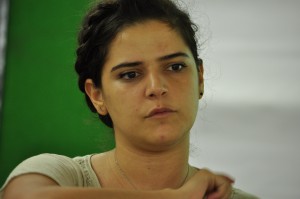Day 2: Is Information Ever Enough ?
 Day 2 of the Youth Advocacy Institute was packed with information and ideological debates.
Day 2 of the Youth Advocacy Institute was packed with information and ideological debates.
In the morning, Dr. Suchitra Dalvie discussed contraception and methods of abortion. She was joined by two support trainers: Rola Yasmine and Preet Manjusha, both of whom are youth champions from the previous year. This session was packed with important information on the menstrual cycle and pregnancy. A few points that seemed to stand out are:
1. The “unsafe period” – or the period during the menstrual cycle when pregnancy is most likely to occur extends from 4 days before the ovulation to 4 days after the ovulation.
2. Ovulation can be predicted by changes in the basal body temperature and by changes in the texture and color of the vaginal discharge. Some women also experience pain in their lower back during ovulation. This is called Mittel Schmerz, or mid-cycle pain.
3. Basal body temperature is recorded before one gets out of bed, at the same time everyday. Around ovulation there is a spike in the basal body temperature.
4. The vaginal discharge becomes translucent and stringy during ovulation.
5. It takes about a week for the fertilized egg to be implanted in the uterus.
6. The pregnancy test is positive only after implantation of the egg.
7. The pregnancy test therefore becomes positive only about a week after implantation. So, pregnancy tests may show false-negative results in the first seven days after sex.
 This was followed by a discussion on the methods of contraception and abortion. Rola Yasmine highlighted the social context and the power relations that have to be explored while promoting contraceptives in patriarchal societies. Preet Manjusha then spoke about medical abortion, explaining that it is a safe and non-invasive procedure.
This was followed by a discussion on the methods of contraception and abortion. Rola Yasmine highlighted the social context and the power relations that have to be explored while promoting contraceptives in patriarchal societies. Preet Manjusha then spoke about medical abortion, explaining that it is a safe and non-invasive procedure.
Shilpa Shroff then helmed a session on abortion laws. It was interesting to learn that abortion is not illegal in any of the participating countries: Bangladesh, China, India, Indonesia, Myanmar, Nepal, Philippines, Sri Lanka and Vietnam, but highly restricted in many of these countries. This leads to interesting debates on negotiating terms with legal authorities and law makers.
After lunch we moved to ideological debates with a session on what it means to be pro-choice, and discovering how far we would go to support women’s autonomy, and their rights to make decision for their own bodies, even if this meant that we might have to face uncomfortable questions from the opposition.
 The day ended with two very interesting debates on Dirty Dancing and Cider House Rules, both of which depict unsafe abortion, and the ways in which restrictive laws impede access to safe abortion. The films also gave the participants an opportunity to discuss intersectionality, conscientious objection and the ways in which women negotiate their spaces in patriarchal societies. We will write about these discussions in a separate blog.
The day ended with two very interesting debates on Dirty Dancing and Cider House Rules, both of which depict unsafe abortion, and the ways in which restrictive laws impede access to safe abortion. The films also gave the participants an opportunity to discuss intersectionality, conscientious objection and the ways in which women negotiate their spaces in patriarchal societies. We will write about these discussions in a separate blog.
At the end of the day, we felt very gratified with our ideological debates, but we could not help feeling that we could have used more time to share facts on abortion and contraception. But we will continue to mentor our youth champions over the next year, strengthening their positions not only as advocates but as sources of accurate information.
We are sharing this information live on Facebook and Twitter. Do follow us, and watch this space for more on the Youth Advocacy Institute 2013!






